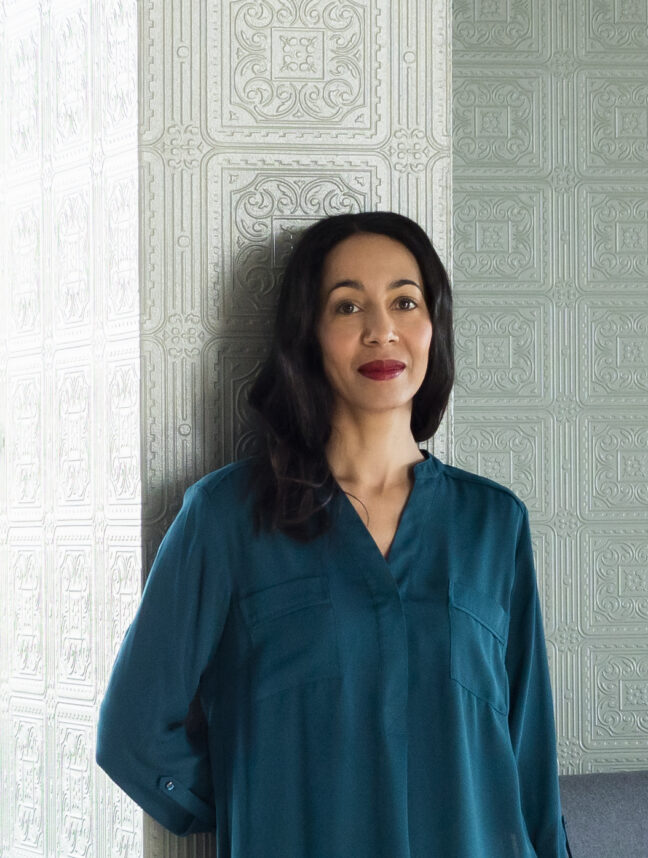More so than ever before we need our homes to be places of support and solace. But they can only become this if we harness their power correctly. My Happy Inside philosophy therefore stems from the assertion that your home environment has as much impact on your wellbeing as the traditionally perceived twin pillars of good diet and exercise. After all, it’s a lot harder to create healthy food in a hectic kitchen, sleep well or honour thyself through exercise if what surrounds you brings you down.

So, rid yourself of clutter and contaminants, then finish and furnish your home exclusively with things of meaning – from the colours and materials used for walls and floors to every single possession you bring inside, whether soup spoon or sofa. The goal is consistent considered curation – limiting the distractions while increasing what truly sustains you in order to focus fully on living a purposeful life.
My philosophy also entails a change in mindset. After all, in an era when ‘Fear of Missing Out’ has its own universally understood acronym, recuperative rest and relaxation are not always regarded as the intensely worthwhile pursuits that they are. Instead, we are harassed into believing that we must be constantly available to be of value, that peak productivity and performance are directly related to presenteeism, and that to snooze is to lose. This couldn’t be more wrong. Instead, we must recognise that to stop is to succeed; and we must arrange our homes in such a way as to make this easy for us.
And yet, perhaps ironically, it is one of the hardest states of being to achieve. Many of us have become hard-wired to oscillate between being in full-on work mode and exhausted. Hooked on constant motion and the completion of never-ending to-do lists, we grind to a halt rather than feeling buoyed up by the prospect of doing something else. This is no way to go on. Here, then, are six ways to start afresh, extracted from chapter six of my book Happy Inside: How to Harness the Power of Home for Health and Happiness.
Six steps to good active rest
1. Stopping is the path to success
The classical Greek philosopher Aristotle said: “Nature requires us not only to be able to work well, but also to idle well.” He understood that we are not machines capable of toiling 24/7 like robots. Constantly pushing ourselves to achieve against all the odds offers no respite for reflection. We need downtime to allow insight to flower. Take, for instance, that great philosophical question: what makes a good life? For decades this has been defined as ‘success’, where that was understood to be a function of money, fame or power. It is always a revelatory moment when we realise that none of these guarantee any such thing and, in fact, the pursuit of them quite often ensures the very opposite. However, Aristotle also said: “Excellence is never an accident. It is always the result of high intention, sincere effort and intelligent execution; it represents the wise choice of many alternatives – choice, not chance, determines your destiny.” In other words, the decision to live ‘a good life’ replete with wellbeing is entirely within your own hands.

2. Active rest time needs to be scheduled
Following on from the above, here comes the ‘but’. It won’t just happen by itself; you have to seize the moment and consciously decide that you want – and, more importantly, need – to partake in active rest more than you want to do something else. Determine a time at which you will stop work, no matter what, so that you can go to that life-drawing class, or for a short walk before picking up the kids, or, better yet, for a walk afterwards with the kids. Signing up for courses is an excellent way to ingrain a commitment to do something ‘other’ – you pick something of interest, find a time slot that fits into existing commitments, and you show up. It can be a tremendous first step in prioritising time for yourself, and once you realise that you really can do this, perhaps that sliver of time becomes yours for the long term. By putting yourself first in this way, you become more able to give others what they need. So, find a chink of time, however small, and start to drive a wedge into it to open it up as far as possible. You don’t have to dive right in with salsa classes!
3. Do the hardest thing first
Whenever we have a lengthy to-do list, at home or at work, it is tempting to knock all the smaller items off first so that we feel we have achieved something. Except it never works because gnawing away at the back of our subconscious is the knowledge that the tricky email, essay, article or thing to be mended, is still sitting there, awaiting our attention. By putting it off, we undermine any ongoing attempts at efficiency, let alone rest, because we know that this is the one thing that really must get done. It’s like facing a fear: we give it too much power by not confronting it. And most often, as soon as we do this, we realise that it was not that scary after all – the medical test result is negative or the task was not as hard as we thought. Plus, once we have tackled the hardest thing first, everything else is easier! And even if that test result was positive, now we can seek help to get healed rather than causing ourselves more strife by worrying about it or leaving anything to get worse.

4. Accept that multi-tasking is a myth
It is not possible to do more than one thing at a time and hope to do any of them well. Whether writing notes during a presentation, instead of just listening, to driving while talking on the phone (even hands-free), neuroscience indicates that far from effortlessly orchestrating two tasks at once, the brain rapidly switches focus between one and the other in a stop/start process that is inefficient, mistake-prone and energy sapping. It follows, therefore, that if you have a specific task to complete that requires your full concentration, switch your phone to silent and turn off all notifications (especially the ones that ‘helpfully’ pop up on the corner of your computer screen).
5. Practice ‘deep play’
This is a term coined by Dr Alex Pang, author of Rest: Why You Get More Done When You Work Less. He uses it to describe hobbies that offer some of the same psychological rewards as your job but in a different setting and without the frustrations of work – activities that give your subconscious the chance to take up the problems that your conscious mind has not yet been able to solve. And if we observe young children, it’s clear that they intuitively understand that time spent in play is never time wasted. A lesson that gets lost the older we become. It recalls one of George Bernard Shaw’s greatest quotes: “We do not stop playing because we grow old; we grow old because we stop playing.”
6. It’s a sprint, not a marathon
When it comes to active rest, short bursts are preferable to extended lounging. How you spend your rest time is far more important than how long you do it for, with the key factor being the level of escape and detachment it affords from whatever constitutes your daily toil. Whether exercise or play, 10 minutes of intense ‘otherness’ will do you infinitely more good than an hour of passive phone scrolling.

Michelle Ogundehin is internationally renowned as a thought-leader on trends, colour and style. Originally trained as an architect and the former Editor-in-Chief of ELLE Decoration UK, she contributes to prestigious publications worldwide. She is also the lead judge on the BBC2/Netflix series Interior Design Masters – series two launches on BBC2 on 2 February 2021 – and the author of new book Happy Inside: How to Harness the Power of Home for Health and Happiness – a game-changing guide to living well.
Effect Magazine is brought to you by Effetto



